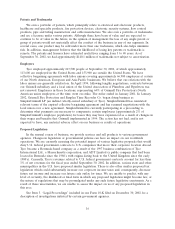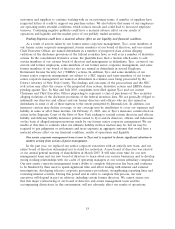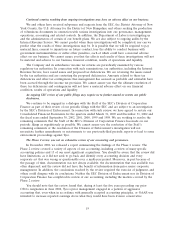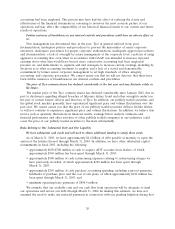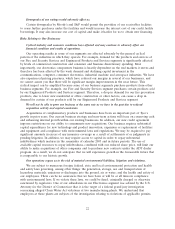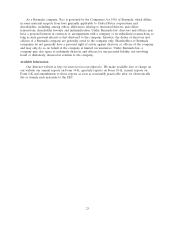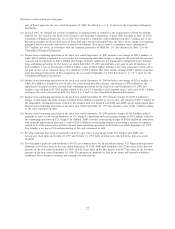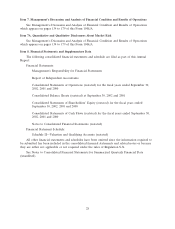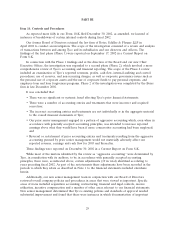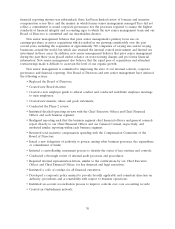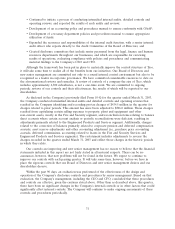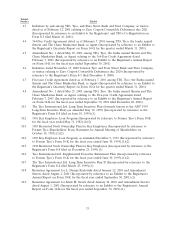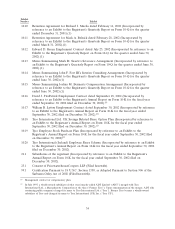ADT 2002 Annual Report Download - page 26
Download and view the complete annual report
Please find page 26 of the 2002 ADT annual report below. You can navigate through the pages in the report by either clicking on the pages listed below, or by using the keyword search tool below to find specific information within the annual report.potential litigation. The defense of these lawsuits may divert our management’s attention, and we may
incur significant expenses in defending these lawsuits. In addition, we may be required to pay awards or
settlements that could cause a material adverse effect on our financial condition and results of
operations.
Our ADT business has recently experienced higher rates of customer attrition, which may reduce our
future revenues and has caused us to change the useful life of accounts, increasing our depreciation and
amortization expense.
Attrition rates for customers in our global electronic security services business have increased to
14.4% on a trailing 12-month basis for the quarter ended March 31, 2003, compared to 13.2%, 12.3%
and 13.0% for the full fiscal years ended September 30, 2002, 2001 and 2000, respectively. If attrition
rates continue to rise, ADT’s recurring revenues and results of operations will be adversely affected. In
the second quarter of fiscal 2003, the Company retroactively changed the amortization of costs of
ADT’s contracts and related customer relationships purchased through the ADT dealer program from
a straight-line method generally over a ten-year period to a double-declining balance method based on
a ten-year life for the first eight years of the estimated life of the customer relationships, converting to
the straight-line method of amortization to completely amortize the asset pool by the end of the twelfth
year. No change was made in the method used for the internally generated residential and commercial
account pools, since the Company concluded that the straight-line method was most appropriate given
the most recently observed attrition data for those account pools. If the attrition rates were to rise for
these account pools, then the Company may be required to accelerate the amortization of the costs
related to these pools.
Risks Relating to Our Jurisdictions of Incorporation
Proposed legislation and negative publicity regarding Bermuda companies could increase our tax burden
and affect our operating results.
Several members of the U.S. Congress have introduced legislation relating to the tax treatment of
U.S. companies that have undertaken certain types of expatriation transactions, which could be deemed
to cover the combination in 1997 with ADT, as a result of which ADT, a Bermuda company, changed
its name to Tyco and became the parent of the Tyco group. Any such legislation, if enacted, could have
the effect of substantially reducing or eliminating the tax benefits of our structure and materially
increasing our future tax burden or otherwise adversely affecting our business. In addition, even if no
tax legislation is ultimately enacted that specifically covers our 1997 combination, the enactment of
other tax proposals that have been or may be made in the future to address expatriation transactions
could have a material impact on our future tax burden. Other federal and state legislative proposals, if
enacted, could limit or even prohibit our eligibility to be awarded U.S. or state government contracts.
We are unable to predict the likelihood or final form in which any proposed legislation might become
law or the nature of regulations that may be promulgated under any such future legislative enactments.
As a result of these uncertainties, we are unable to assess the impact on us of any proposed legislation
in this area. There has recently been negative publicity regarding, and criticism of, U.S. companies’ use
of, or relocation to, offshore jurisdictions, including Bermuda. As a Bermuda company, this negative
publicity could harm our reputation and impair our ability to generate new business if companies or
government agencies decline to do business with us as a result of the negative public image of Bermuda
companies or the possibility of our clients receiving negative media attention from doing business with
a Bermuda company.
Bermuda law differs from the laws in effect in the United States and may afford less protection to holders
of our securities.
Holders of Tyco securities may have more difficulty protecting their interests than would holders of
securities of a corporation incorporated in a jurisdiction of the United States. See ‘‘Enforcement of
Civil Liabilities.’’
24




